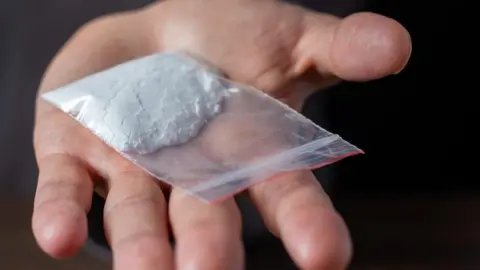Monkey dust: 'An ounce could destroy a community'
 Getty Images
Getty ImagesThe drug monkey dust could "cause havoc" across the UK if it continues to spread, an addiction recovery coach has said.
Adam Brown, from Milton, Stoke-on-Trent, questioned a recent report from the Advisory Council on the Misuse of Drugs (ACMD), which said reclassifying the drug from Class B to Class A was unlikely to have much of an impact.
Mr Brown said the effect of the drug on those who take it was "crazy" and addicts needed to be taken out of society to recover but there was not enough support available.
The government said it understood the impact monkey dust could have, adding that its "plan for change" would drive down drug use.
Mr Brown told BBC Radio Stoke reclassifying the drug could discourage dealers from selling it, adding that affordability, availability and the lack of a suitable deterrent was why it was such an issue in Stoke-on-Trent.
"It's just a free-for-all. Everyone's just getting it, selling it, making loads of money and there's just no risk [for dealers]," he said.
"An ounce of it could destroy an entire community and for having that, you would get a fine."
He said it had the potential to spread and "cripple" the NHS and police forces.
"It's spreading and if it spreads around the country... it's going to cause havoc," he added.
'Emerged as a problem'
The report from the ACMD said monkey dust, a synthetic psychoactive substance, had "emerged as a problem in Staffordshire".
It said markets for the drug were concentrated in Stoke-on-Trent, Stone, Stafford, Newcastle-under-Lyme and Uttoxeter, as well as in Shrewsbury and Telford in Shropshire.
Analysis of police records showed officers were called about monkey dust-related incidents almost 15 times per day in 2023 and 2024, the ACDM added.
Of the 75 deaths involving a synthetic cathinone recorded in the UK between 2019 and 2023, 52% happened in Staffordshire, according to the report.
It said the disadvantages of making it a Class A drug outweighed the positives, adding that the issue in Staffordshire would be "more effectively addressed by a public health approach".
Mr Brown, who has worked with people addicted to the drug, said there needed to be more funding and support in place to help addicts.
"There is nowhere near enough support to tackle the problem we've got in this city," he added.
Follow BBC Stoke & Staffordshire on BBC Sounds, Facebook, X and Instagram.
